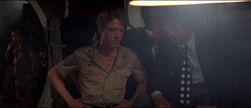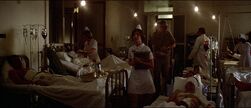As a war-themed film, it rarely depicts war scenes, but more about life. The director pays more attention to the lasting, far-reaching, and irreversible effects of war on people. It is both physical and spiritual.
In a simple and life-recording way, the war is indirectly represented, the war is turned into the background, and a large number of fragments are used to express the life far away from the war but the war is everywhere. More emphasis is placed on depicting the pain caused by war with a lyrical slow rhythm. This pain belongs not only to the soldiers themselves, but also to the entire generation associated with them. The prose narrative of life may be lengthy and boring, but it is long and intriguing.
Because what it presents is not all contradictions and conflicts, but the texture of life itself. Life itself is fragmented and scattered, and there is no contradiction or strict logical sequence that arises and turns.
In the previous part, the director used a very long clip to show the joy and carnival of young people before going to the battlefield. The cheerful and passionate wedding dance scene makes people can't help but jump into the picture and let themselves fly. The extensive presentation of life before the war makes the subsequent post-war passages exude a strong sense of disillusionment and tragedy.
When Michael, played by De Niro, returned to his hometown, the lyrical and sentimental music sounded, and with a soothing and distant rhythm, the timidity and sentimental sadness of the hometown was expressed implicitly and in place. It is a powerful manifestation of the irreparable damage that war has brought to people.
The most intense and gripping scene in the film is the play of Russian roulette. In war, life becomes an instrument of gambling. The screeching noise of gambling, the small, cold revolver, and the huge pile of crumpled banknotes being swung wildly by a pair of hands, and the smashed head splashing red liquid, restless images Make it all seem like a violent carnival full of blood, absurd nothingness, fanatical worship. It shows the alienation of people and the distortion of the mind caused by the war.
View more about The Deer Hunter reviews











